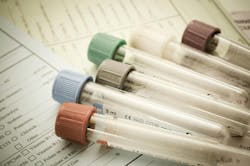For patients at risk, a simple blood test can help doctors predict likelihood of future heart attack, other cardiac events, and death
A new prognosis claim for the Siemens Healthineers Atellica IM High-Sensitivity Troponin I (TnIH) test helps healthcare providers identify patients at risk of death and major cardiac events that could occur up to one year after presenting to the emergency department with signs and symptoms of acute coronary syndrome.
It is the first test of its kind in the United States to receive FDA clearance for prognosis.
The Atellica IM TnIH blood test is used in many hospitals across the country to measure cardiac troponin I in a patient’s blood. Cardiac troponin I is a specific and sensitive biomarker that indicates heart muscle injury.
For the large number of chest pain patients who do not end up with a current heart attack diagnosis, the Siemens Healthineers Atellica IM TnIH test may provide information about their impending risk. As many as 48.9% of patients with an elevated cardiac troponin I result will go on to experience death or a major adverse cardiac event.
The guideline-acceptable High-Sensitivity Troponin I tests are well-established aids in the diagnosis of heart attack for use on the Atellica Solution, Atellica CI Analyzer, and ADVIA Centaur platforms. With a 10-minute time to first result, the Atellica IM TnIH test now can be used as an aid in prognosis for 30-, 90-, 182-, and 365-day all-cause mortality and major adverse cardiac events (MACE) in patients presenting with signs and symptoms suggestive of acute coronary syndrome (ACS). MACE consists of myocardial infarction, urgent revascularization, cardiac death, or heart failure hospitalization.

